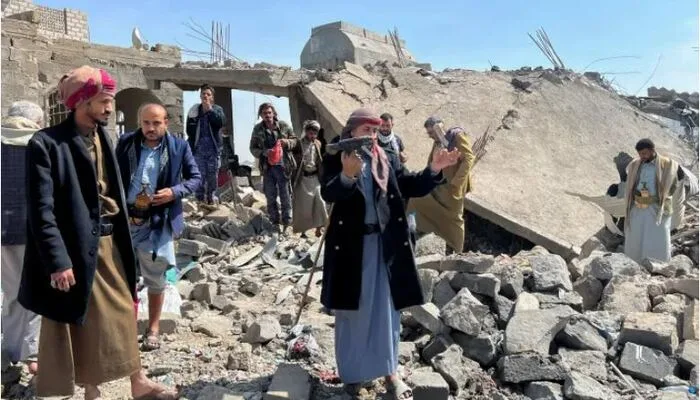SANAA — The United States’ bombing campaign in Yemen has killed at least 123 people since mid-March, according to Yemen’s Ministry of Health. Most of the victims were civilians, including women and children.
The ministry announced on Monday that 247 others had been injured in the strikes. US attacks, it added, have targeted families, homes, infrastructure, and military sites.
The recent escalation began with Washington’s promise to stop Houthi attacks on Israel and ships in the Red Sea. US President Donald Trump vowed that the Houthis would be “completely annihilated.” Daily US strikes now hit several parts of Yemen.
Despite the bombardment, the Houthis—also known as Ansar Allah—have refused to back down. The group says it will continue attacking Israel until the siege on Gaza ends. They describe their actions as part of their solidarity with Palestinians.
On Sunday, a US strike hit a ceramic factory in Sanaa province. Six people were killed and 30 others were injured. The Ministry of Health condemned the attack. “We hold the American administration fully responsible for its continuing crimes and massacres,” it said.
The ministry also accused the US of deliberately targeting civilian infrastructure and killing government officials.
On Monday, Houthi-run Al Masirah TV reported more American attacks. It said 15 US strikes hit areas in the Marib governorate.
Washington maintains that its campaign is aimed at disabling the Houthis’ ability to threaten Israeli targets and disrupt shipping routes in the Red Sea. The US considers the group a threat to regional security and commerce.
The Houthis claim otherwise. They argue that the strikes have mostly targeted civilian areas and have done little to stop their operations.
Over the weekend, the group said it fired two missiles at Israel and launched a drone strike at a “vital” location on the Israeli coast. The Israeli military confirmed one missile was intercepted. Sirens sounded in Jerusalem and Tel Aviv during the incident.
Read: World Must Act: UNICEF Pleads for Immediate Access to Starving Gaza
Yemeni’s Honourable Support
In response, Hamas praised the Houthis. Abu Obeida, a spokesman for Hamas’s military wing, issued a statement calling the Yemeni support “honourable.” He said Palestinians would never forget Yemen’s stance.
“The honest brothers in Yemen continue to insist on paralysing the heart of the Zionist entity,” he said. “They stand by Gaza, which is facing genocide, despite paying a heavy price.”
While the US insists its campaign is weakening the Houthis, the group maintains its military capabilities remain strong. It claims the US strikes have failed to stop its mission and have instead worsened the humanitarian situation in Yemen.
So far, there is no indication that the US will halt its campaign. And the Houthis say they will not stop their actions against Israel.
As the situation escalates, civilians in Yemen continue to suffer the most.
